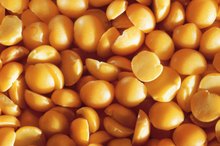Winter Squash Allergy
Winter squash is indigenous to North America and was a staple in Native American diets. According to the World’s Healthiest Foods website, winter squash is grown between August and March, with peak season running during October and November. Winter squash is not commonly an allergenic food. However, there are preventive measures you can take and treatment available through a doctor if you suspect a winter squash allergy.
Nutrition Facts
WHFoods explains that winter squash is generally a tolerable food with a host of nutritional benefits that can help prevent heart disease, colon disease and lung cancer. A 1-cup serving of winter squash exceeds your daily necessary intake of vitamin A and also contains high levels of manganese, vitamin C, fiber and potassium. Other nutrients include vitamins B1, B3, B5 and B6, as well as copper and folate.
Allergic Symptoms
An Allergy to Mustard
Learn More
According to the American Academy of Allergy, Asthma and Immunology, the most common types of food allergy symptoms are external, thereby appearing on the skin in the form of rashes and hives. Your skin may also turn red and swell. A winter squash allergy can also cause tongue and mouth swelling. Diarrhea and vomiting can also occur in conjunction with respiratory ailments such as wheezing.
- According to the American Academy of Allergy, Asthma and Immunology, the most common types of food allergy symptoms are external, thereby appearing on the skin in the form of rashes and hives.
- A winter squash allergy can also cause tongue and mouth swelling.
Severe Reactions
A severe winter squash allergy accompanied by a low tolerance to it can result in a more severe reaction. In some cases, the allergic reaction is so severe that your body rapidly enters into a state of shock. The American Academy of Allergy, Asthma and Immunology reports that this reaction is better known as anaphylaxis. Symptoms of anaphylaxis include wheezing, chest tightness, dizziness and unconsciousness. Failure to treat anaphylaxis can result in death.
- A severe winter squash allergy accompanied by a low tolerance to it can result in a more severe reaction.
Considerations
Home Remedy for a Jalapeño Pepper Allergy
Learn More
WHFoods reports that winter squash is one of the least allergenic foods and does not contain high levels of purines and oxalates. Still, this does not rule out the possibility of a winter squash allergy, especially if you have allergies to other foods in the Cucurbitaceae family. Examples include melons and cucumbers. Once you have a reaction to any such food, do not eat other types in the Cucurbitaceae family until you receive testing and a diagnosis from a doctor. Some food allergies are even outgrown over time.
- WHFoods reports that winter squash is one of the least allergenic foods and does not contain high levels of purines and oxalates.
- Still, this does not rule out the possibility of a winter squash allergy, especially if you have allergies to other foods in the Cucurbitaceae family.
Prevention/Solution
Avoiding winter squash and similar foods will reduce your chances of reaction if you have a winter squash allergy. The American Academy of Allergy, Asthma and Immunology recommends that you receive a diagnosis from an allergist before taking any medications for food allergies. Skin prick tests and blood tests are conducted to see what allergens you react to. Severe reactions to the accidental consumption of winter squash can be treated by epinephrine shots at an emergency room. Frequent anaphylaxis to food allergies may prompt your doctor to prescribe epinephrine to you so that you can inject yourself as needed.
- Avoiding winter squash and similar foods will reduce your chances of reaction if you have a winter squash allergy.
- The American Academy of Allergy, Asthma and Immunology recommends that you receive a diagnosis from an allergist before taking any medications for food allergies.
Related Articles
References
- WHFoods: Squash, Winter
- U.S. Department of Agriculture. Squash, winter, butternut, cooked, baked, without salt. FoodData Central. 2019.
- USDA. Daily Nutritional Goals for Age-Sex Groups Based on Dietary Reference Intakes and Dietary Guidelines Recommendations. 2020.
- Butternut pumpkin, boiled. Glycemic Index Database. The University of Sydney. Updated November 2019
- National Institutes of Health, Office of Dietary Supplements. Vitamin A. Updated February 14, 2020.
- Wong IY, Koo SC, Chan CW. Prevention of age-related macular degeneration. Int Ophthalmol. 2011;31(1):73-82. doi:10.1007/s10792-010-9397-5
- Di Noia J. Defining Powerhouse Fruits and Vegetables: A Nutrient Density Approach. Prev Chronic Dis. 2014;11:E95. doi:10.5888/pcd11.130390
- Harrison FE, May JM. Vitamin C function in the brain: Vital role of the ascorbate transporter SVCT2. Free Radic Biol Med. 2009;46(6):719-730. doi:10.1016/j.freeradbiomed.2008.12.018
- Jacobo-Valenzuela N, Zazueta-Morales J. Chemical and physicochemical characterization of winter squash (Cucurbita moschata D.). Notulae Botanicae Horti Agrobotanici Cluj-Napoca. 2011;39(1). doi:10.15835/nbha3915848
- Pullar JM, Carr AC, Vissers MCM. The Roles of Vitamin C in Skin Health. Nutrients. 2017;9(8):866. doi:10.3390/nu9080866
Writer Bio
Kristeen Cherney began writing healthy lifestyle and education articles in 2008. Since then, her work has appeared in various online publications, including Healthline.com, Ideallhealth.com and FindCollegeInfo.com. Cherney holds a Bachelor of Arts in communication from Florida Gulf Coast University and is currently pursuing a Master of Arts in English.









